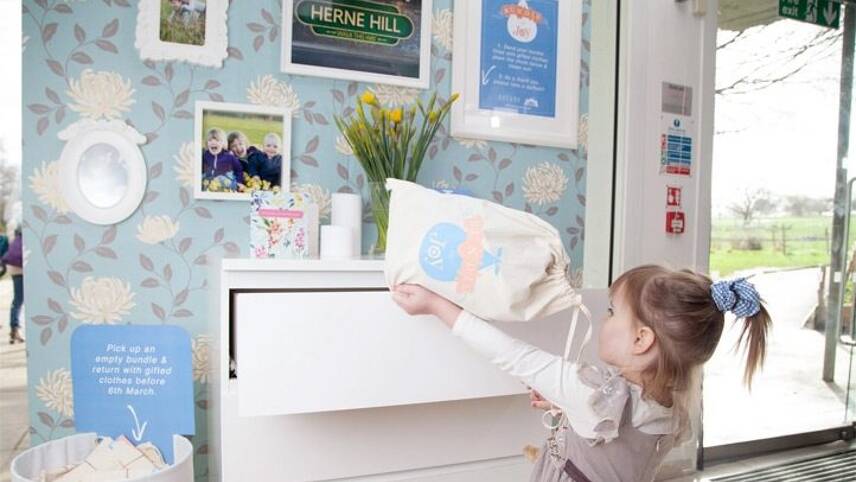Register for free and continue reading
Join our growing army of changemakers and get unlimited access to our premium content

It is a thorny problem. Companies need to ensure their response is authentic to avoid the accusation of ‘greenwash’, they must avoid being seen as part of the elite ‘nanny state’ and in a time of increasing financial pressures the solution has to be cost-effective and good for business.
The charity I founded, Hubbub, has been working with a growing number of businesses to find a way of talking to customers about sustainability in a way that is positive, engaging and ultimately good for business. Their responses have been very different, here are three examples.
Mothercare – Gift a Bundle
The High Street retail sector is facing enormous challenges. Footfall is decreasing and costs are rising. How can retailers encourage people into store and build a growing sense of loyalty to the brand by doing good?
The Gift a Bundle campaign builds on the insight that many families have beautiful out grown baby clothing stashed away in their homes. They are often reluctant to donate this clothing to charity shops as the clothes hold memories of their children growing.
Gift a Bundle invites groups of parents to come together to create gift bags of high quality out-grown clothing. They are encouraged to write a message on the bag explaining why the piece of clothing is important to them and why they hope it will be useful to someone else. The gift bags are taken to a participating mothercare store and then on Mothers Day are donated to local charities.
The campaign works on a number of levels for mothercare. It encourages people to visit stores to collect and return their gift bags. It generates a sense of community between new parents linked to the mothercare brand. It is easy for staff to get involved and it helps them build links with local charities through the gifting sessions.
This year 42 mothercare stores are participating in the campaign with the aim of helping 6,500 families and extending the life of 65,000 pieces of baby clothing http://bit.ly/2m6vtUd.
IKEA – Live Lagom
IKEA wanted to boost sales of its sustainable product range and increase levels of understanding amongst their co-workers and customers about the considerable strides the company is taking towards becoming more sustainable.
Live Lagom sought to get deep insight from IKEA’s customers on the things that mattered to them and to make it as easy as possible for them to save energy, cut waste, reduce water use and become more active. For the past three years over 100 customers per year based around IKEA stores have been invited to Live Lagom. They have received house visits, been on store tours and been given money enabling them to select IKEA products that help them live more sustainably at home. The University of Surrey is independently measuring impact.
Through Live Lagom IKEA now has a growing number of customer stories showing others how they have saved money and become greener. IKEA has opened up a new way to talk to customers including room sets in store, workshops on things such as fermenting and an increasingly active Facebook group participating in discussions through Facebook Live. Co-workers have learned more about IKEA’s sustainability strategy as they have an increasing number of customers asking for advice http://www.ikea.com/gb/en/ikea/ikea-live-lagom/
Starbucks – Disposable Cup Charge
In January the Environment Select Committee proposed that there should be a 25p ‘Latte Levy’ charged on disposable coffee cups. Starbucks decided to take a leadership position on this proposal by voluntarily imposing a 5p charge on disposable cups in over 30 of their central London stores for three months. The collected charge is being donated to Hubbub to explore what can be done to promote reusable cups and to support some wider circular economy campaigns.
The levy has required Starbucks to change working procedures, to engage employees and to run an extensive customer engagement campaign. The move has generated enormous publicity for Starbucks, most of which has been positive. It has enabled them to put the systems in place that will help them respond to the Latte Levy if it is imposed. Most importantly it has opened up a new avenue of conversation with their customers building an understanding as to how the company can promote a strong environmental message and offer a great service.
We are seeing a shift in customer expectations about how companies are responding to wider global challenges such as plastic pollution. Our belief is that companies need to get onto the front foot and be proactive in responding to this change and develop an approach that is both credible and works for the broader business model.
Trewin Restorick at edie Live
Hubbub’s founder Trewin Restorick will appear on the Resource Efficiency theatre at edie Live to discuss the role that sustainability and resource efficiency professionals can play in changing how people think and act towards the circular economy.
Running between 22 – 23 May 2018, edie Live plans to show delegates how they can achieve their Mission Possible. Through the lens of energy, resources, the built environment, mobility and business leadership an array of expert speakers will be on hand to inspire delegates to achieve a sustainable future. For more information click here.



Please login or Register to leave a comment.